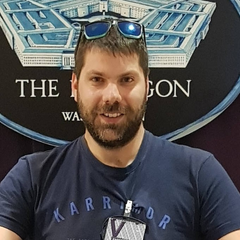On the topic of job interviews, several articles and guides can be found on the Systeum blog - you can learn, for example, about the rules for online interviews, how to make the best first impression, or what your CV should look like.
With this article, Martin Smětala would like to broaden your perspective on the interview as such. We will look at what an interview actually is, what its individual phases are, and focus on what is important for each of them.
Let's start from the very beginning. What is an interview?
An interview is a business meeting between two parties, each offering something and demanding something in return.
Like any other business meeting, it is governed by several basic rules:
- Ice-breaking
- Analyzing the needs of the other party
- Proposal of a solution
- Supplementing the solution and finding common ground
- Agreeing on joint cooperation
These rules apply to both the candidate and the hiring manager. Both parties should keep in mind that they are not only in the role of a judge but also in the role of an applicant.
Are you interested in working in the IT field? Would you like to work as an IT specialist? Check out our job offers and job vacancies. Whether you are a junior programmer or a senior programmer, a beginner tester or a senior tester, contact us and we will find you a tailor-made IT project.
Let's look at each step in more detail from the candidate's perspective.
-
Ice-breaking
Ice-breaking, or creating a pleasant atmosphere at the beginning of the meeting. This is often an overlooked phase of the interview, but it has a very important effect.
From a psychological perspective, the other party will form an impression of you during the first few minutes of the encounter. The way you talk, shake hands, sit, or what you talk about - all of this can affect how you spend the rest of the meeting (both positively and negatively).
There are several ways to engage in ice-breaking - it depends on how creative and courageous you are. It is certainly a good idea to thank the other party for making time for you and giving you the opportunity to meet.
Of course, you can go even further. For example, I still remember one candidate for the Account Manager position who brought pastries to the interview. She didn't present them as "plums from the garden", but more in the style of sweetening our conversation. It wasn't forced or intrusive, rather it relaxed the atmosphere and the ice-breaking worked great.
It is clear that it is not always appropriate to bring pastries. 😊
-
Analyzing the needs of the employer
As a candidate, you definitely want to know what benefits the manager expects from the open position (i.e., find out his/her needs). It is appropriate for you to start by getting the manager to open up. The project description (job description) often contains only fragmented information, and now you have the opportunity to learn everything essential.
Example:
The manager wants to strengthen the team responsible for the development of internet banking. The manager expects the benefit to be a faster response to the competitive struggle of other banks and more stable deliveries within the framework of releases.
At the beginning of the position introduction, the candidate might be interested in how the manager envisions the ideal person for this position. How would they ideally imagine the cooperation, what does the team expect from the new member, what could be the first tasks, based on which you will evaluate successful cooperation, etc. These are open questions that the other party can answer in a broader context.
You don't have to treat this phase as an interrogation – focus on 2-3 important questions and then let the manager rest by introducing yourself. You can delve into more detailed questions later during the interview. I've experienced interviews where the candidate continuously asked questions for over 45 minutes out of the total 60 minutes allocated for the entire meeting...
-
Solution proposal – candidate introduction
After the initial introduction of the position and the employer, it's the candidate's turn to introduce themselves. In this phase, the manager verifies whether the candidate has the prerequisites for solving the problems that the open position requires.
In the introduction, it's appropriate to focus on what is truly important to the manager and what emerged from the analysis of their needs – skip education or even current experience if you have older information that the manager is looking for. Of course, sometimes it's appropriate to mention your education, depending on the circumstances.
In short, focus on what is key for the other party. If the manager is interested in more information, they will certainly ask you about it themselves.
The introduction should take about 10 minutes. Of course, if the manager has additional questions, this phase can be extended.
Sometimes interviews start directly with the candidate's introduction. In such cases, it's appropriate to begin with a general introduction about yourself, and you can later provide more details during the manager's introduction about your specific experiences that might be interesting for them.
Tip: As a candidate, it's not appropriate to speak in the plural (e.g., "we developed...", "we tested..."). It's confusing, and the other party doesn't know what your specific added value was within the team.
-
Solution refinement and reaching agreement
This is the phase when the manager (or their technical companion) can ask the candidate technical questions to ensure they have the necessary qualifications.
At the same time, this is the phase when the candidate can verify information they are interested in about the project, or more generally about the collaboration, team, employer, etc.
Try to be thorough and think about what is truly important in this phase and what can be clarified later via email if you agree to collaborate.
For example, there's no point in asking about the number of meals in the cafeteria or what kind of coffee they have in the kitchen. 😊 Keep in mind that each interview is scheduled for a fixed time, and the manager may not have the option to extend it.
-
Agreement on joint collaboration
Once both parties have agreed on the terms of collaboration (solution), it's time to find out when you will learn the results of the interview.
Sometimes, it's also appropriate for the candidate to set a deadline by which they need to make a decision so that the manager does not unnecessarily delay (e.g., due to giving notice to their current employer).
It's a good idea to conclude every interview with an email or message thanking the other party for their time and pleasant meeting. You can also send an invitation to connect on LinkedIn (with a personalized message). By doing this, you'll make an even stronger impression on the manager and make their choice easier in case they have multiple well-matched candidates.
🟡 Are you looking for an interesting project? Check out how we do things here and see which colleagues we're currently looking for.
🟡 Do you have a colleague or friend who is looking for a new project? Join our Referral program and get a financial reward for your recommendation.
🟡 Would you like to start working in IT? Download our ebook START WORKING IN IT: From First Steps to Dream Job, in which we guide you step by step with information, courses, and practical experience that are so essential not only for those who want to switch fields, but also for those who want to advance their careers and further their education.
Or share this article, which may also be useful to your acquaintances.















